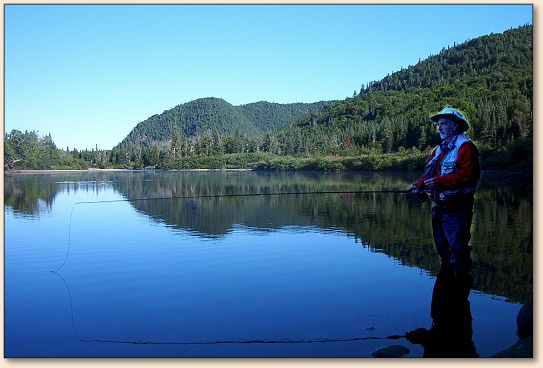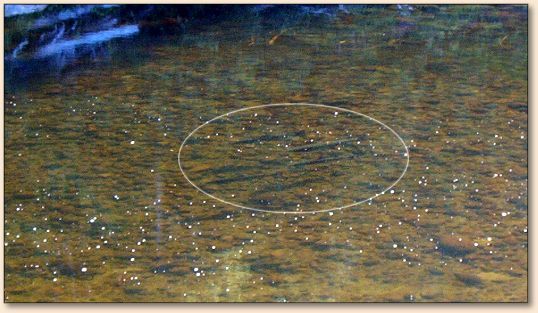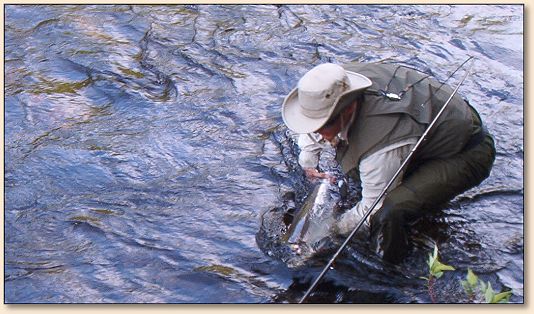Hooked!
By Chris Chin
Here in Quebec, fly fishing is still a bit on the fringe compared
to spin casting. That's too bad. I mean, fishing is a BIG activity
here.
If we could convince just a small portion of spin casters to
convert over to fly fishing … the sport would just sky rocket!
In my never ending quest to initiate folks to the sport,
the same question often comes up: "What is the #1 part
about fly fishing which thrills me the most?"
Oh, tough one…could it be the simple act of casting?
Or maybe it's the preparation to visit far off lands? The peace
and quiet or the spectacular beauty ? (As Betty says –
Trout don't live in ugly places!)
If I had to choose one thing, I guess it would be the anticipation!
The anticipation between the moment that the fly disappears from
the surface of the water and the moment that I can actually feel
the weight of the fish and know that it is hooked.
Fishing dries to Atlantic salmon is a tad different than for trout.
It would take too long to explain the mechanics of how the two
differ in the way they take the fly. None the less, Atlantics usually
don't seem to take a dry fly with the same angle of attack as trout.
This means, if you strike the instant you see the take, you'll often
pull the fly right away from the salmon. A truly difficult reflex to
overcome for anyone who has fished and even worse for
experienced trout fly fishers! When I have visitors up for a very
first experience, they are often intimidated by the thought of having
to WAIT a few seconds BEFORE striking. This only holds true
for dry flies; when fishing wets on a downstream swing, the
salmon will hook itself quite nicely.
Actually, looking back over my journal to get an idea for this
article, my mind is just whirling thinking back to some memorable
dry fly takes over the years!
My favourite is on the #48 here on my home waters, the Ste-Marguerite
River in Central Quebec. A long open and slow moving pool, it is a
holding pool for sea run trout, as well as adult and juvenile salmon.
The trout like to hold on the far side under the big spruce; the
Grisles hold at the tail out. The adults hold in 4 different places:
mid stream current, the tail out and a small spot up and across.
The fourth spot they hold is straight upstream from the pool
almost 100 feet up!

View from the far side– The #48 opens up into an immense pool

Salmon holding high in the column on the #48
The most exciting aspect of casting to this fourth lie is that we
try for it at the very end of the day. The sun sets directly over
the river there and we cast into the setting sun. A quality pair
of polarized glasses is a must!
I set up to cast to the pod of salmon holding on a late July day.
The water level had been dropping all week and I could finally
wade out far enough to be able to cast back upstream to the
salmon we had found there.
The evening is a postcard perfect ending to a long day chasing
salmon and trout. The river is a field of liquid light and I can barely
see my fly as it lands 90 feet upstream. I'm casting almost straight
upstream ‚ only about 6 feet over to the right.
There are over 10 salmon holding there and I had noticed earlier
that at least 4 or 5 of them were holding high in the water column.
My first casts are short and I'm working hard at remembering
everything Deanna (LF) told me so that I can squeeze a few more
feet out of my cast.
THERE! The stars align! The rod loads an 1/10th of an ounce
more and I know the line will shoot the last 5 feet. I drop the fly
over 2-3 more feet and it starts the drift right up from the pod.
It only drifts for about 3 seconds‚ the disappears in a
small and subtle boil!
Now classic Atlantic salmon doctrine says we are supposed to
wait 3 seconds, or you can say out loud "God Save The Queen"
‚Me, in the time I say to myself "Holy crap, it took the fly!!!" it's
time to set the hook.
Then the thrill!
I lift the rod tip and strike with my stripping hand. The line comes
taught then is ripped off of the water's surface. In the setting sun,
the line drops a rainbow of mist and the weight of the salmon
settles deep in to the butt of the rod. The salmon pulls straight
upstream and out too. The 3-4 feet of loose line slides cleanly
out the guides. The water is over 62 degrees so this will be done
quickly. I don't let her pull out much more line and she only gets
into about 10 feet of backing.
In a quick ten minute fight, I never let her get downstream into
the current. I pull hard to get her to come across to me. Within
20 minutes, she is at my feet and the barbless #4 bomber easily
slides out. In a flash she's gone!
I love dry flies! I truly believe that it is the thrill of the anticipation
when fishing dries to salmon that really hooked me!

Boris showing us the patience born of 25 years of experience!

…and the reward!
How do You get your thrills? ~ Christopher Chin, Three Rivers Quebec.
About Chris:
Chris Chin is originally from Kamloops,
British Columbia. He has been fly fishing
on and off ever since he was 10 years old.
Chris became serious about the sport within
the last 10 years.
"I'm a forest engineer by day and part time
guide on the Ste-Marguerite River here in
central Quebec. I've been fishing this river
for about 10 years now and started guiding
about 5 years ago when the local guide's
association sort of stopped functioning."
Chris guides mostly for sea run brook trout
and about 30% of the time for Atlantic Salmon.
"I often don't even charge service fees, as
I'm more interested in promoting the river
than making cash. I like to get new comers
to realize that salmon fishing is REALLY for
anyone who cares to try it. Tradition around
here makes some of the old clan see Salmon
fishing as a sport for the rich. Today our
shore lunches are less on the cucumber sandwich
side and more toward chicken pot pie and Jack
Daniel's."
Chris is 44 years old as of this writing. He
is of Chinese origin although his parents were
born and raised in Jamaica.
To learn more about the Ste-Marguerite River,
visit Christopher's
website. You can email Chis at: Flyfishing.christopher@gmail.com.
Our Man In Canada Archives
|

